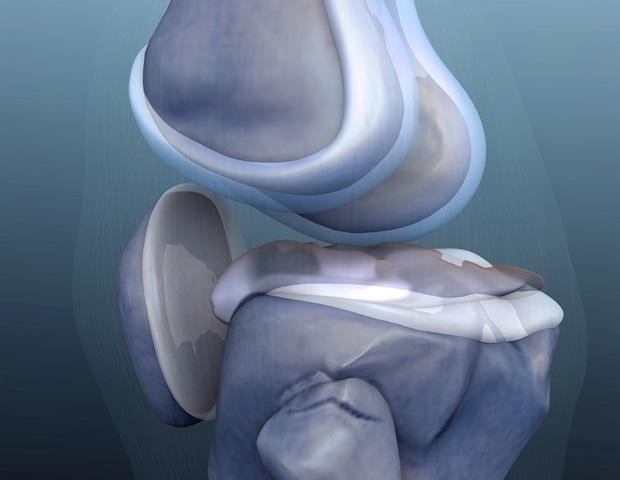
A minimally invasive process offers important aid from knee ache and should forestall the necessity for knee alternative surgical procedure in individuals with osteoarthritis, in line with a research being offered this week on the annual assembly of the Radiological Society of North America (RSNA).
This research addresses osteoarthritis, which is a big public well being difficulty and the main explanation for power ache and incapacity worldwide. With thousands and thousands of individuals affected by knee osteoarthritis, significantly in getting older populations, discovering efficient, minimally invasive remedies is important.”
Florian Nima Fleckenstein, M.D., research’s lead writer, interventional radiologist at Charité – College Hospital Berlin, Germany
Osteoarthritis, a power, degenerative and progressive situation, is the commonest explanation for power joint issues. In accordance with the World Well being Group, knee osteoarthritis impacts over 365 million adults worldwide.
Most out there therapies, corresponding to ache remedy and steroid injections, solely masks the signs of osteoarthritis. They do not sluggish development of the illness. As osteoarthritis worsens and conservative remedies grow to be ineffective, many individuals flip to joint alternative surgical procedure.
Genicular artery embolization (GAE) is an progressive minimally invasive remedy for sufferers with symptomatic knee osteoarthritis. The genicular arteries have a number of branches that type a community across the knee joint. These vessels are altered in sufferers affected by osteoarthritis. In GAE, an interventional radiologist injects small particles into chosen branches that correspond to the location of knee ache to dam blood circulation to that space. Embolization of the irregular blood vessels helps to disrupt the cycle of irritation, cartilage destruction and sensory nerve progress that characterizes osteoarthritis.
For the research, Dr. Fleckenstein and colleagues carried out a retrospective evaluation of 403 instances from sufferers (age 40 to 90) with average to extreme knee osteoarthritis that did not reply to conservative remedies. All sufferers underwent GAE on the Charité – College Hospital Berlin. The research was designed to guage each the security and efficacy of GAE throughout a broad spectrum of osteoarthritis severities. The effectiveness of the process was measured utilizing the Visible Analog Scale and the Knee Damage and Osteoarthritis End result Rating. These standardized scores, which measure ache and high quality of life, have been recorded at baseline and through follow-up visits at six weeks, three months, six months and one-year post-procedure.
Technical success was achieved in 100% of procedures. Non permanent slight pores and skin discoloration and delicate knee ache instantly after the process have been famous in 18% of all instances. No extreme issues have been reported. The standard-of-life index and ache rating improved by 87% and 71%, respectively, at one-year follow-up.
The findings present that GAE is a protected and efficient remedy possibility throughout all severity grades of knee osteoarthritis, together with superior instances the place different remedies have very restricted efficacy.
“Our research discovered that GAE can successfully scale back knee ache and enhance high quality of life early after the remedy, with these advantages being maintained over the long run, particularly for individuals who have not had success with different remedies like bodily remedy or ache medicines,” Dr. Fleckenstein mentioned. “This might probably provide a brand new lease on life for a lot of sufferers who are suffering from debilitating ache and mobility points, brought on by osteoarthritis.”
Nevertheless, the research additionally confirmed that GAE is especially efficient within the early levels of knee osteoarthritis. This means that early intervention might probably delay and even forestall illness development, decreasing the necessity for extra invasive remedies, corresponding to surgical procedure.
The researchers hope that by demonstrating the process’s success in a big and various affected person inhabitants, the research might affect medical observe and coverage, encouraging broader adoption of GAE in scientific settings worldwide.
“GAE has the potential to cut back the necessity for extra invasive surgical procedures, decrease well being care prices and considerably enhance the standard of life for numerous people affected by knee osteoarthritis,” Dr. Fleckenstein mentioned.
He and his crew plan to proceed their analysis on degenerative joint issues to supply sufferers with new choices within the area of interventional radiology.
Co-authors are Timo Alexander Auer, M.D., Bernd Hamm, M.D., Bernhard Gebauer, M.D., and Federico Collettini, M.D. This research was awarded the RSNA Trainee Analysis Prize.

